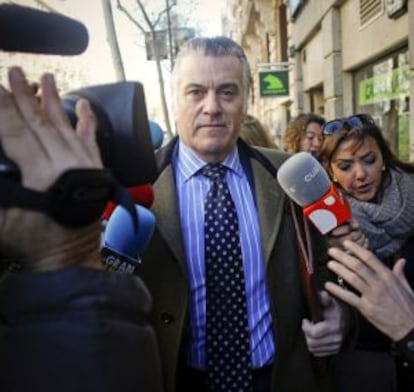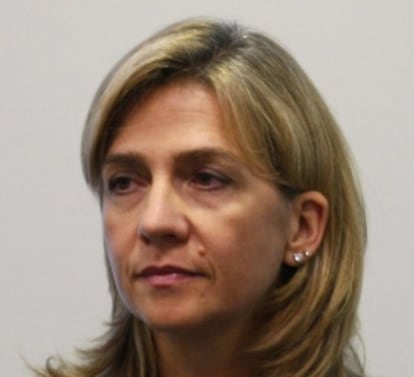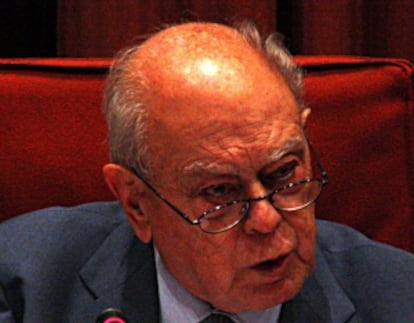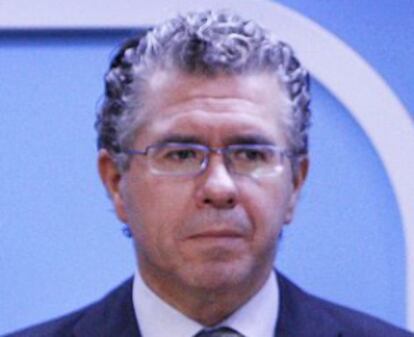Why the New Year will not mean a clean slate for corruption suspects
The king’s sister Cristina and the corrupt Gürtel businessmen will face trial during 2015 A total of 150 cases are in the courts, with more than 2,000 official suspects


The idea that the New Year means a chance to start all over again is often little more than a well-meaning fantasy. And nowhere is that more clear than in Spain, where 2015 is starting with a total of 150 ongoing corruption cases in the courts, with more than 2,000 official suspects, according to calculations by news agency Europa Press. Some of these cases are very high profile, such as the wide-reaching Gürtel kickbacks-for-contracts scandal, which has plagued the governing Popular Party for years now, and the Nóos case, which will see the king’s sister-in-law, Cristina, stand trial for tax fraud.
The mammoth Gürtel inquiry is investigating a group of businessmen led by Francisco Correa, who allegedly paid kickbacks to Popular Party (PP) politicians between 1999 and 2005 in exchange for juicy public contracts in Valencia, Madrid and Castilla y León. Those expected to stand in the dock during the first phase of trial are Correa and his former right-hand man in Valencia, Álvaro Pérez; former PP official Pablo Crespo; and former party treasurers Luis Bárcenas, Álvaro Lapuerta and Ángel Santís.
The mammoth Gürtel inquiry is investigating a group of businessmen who allegedly paid kickbacks to Popular Party (PP) politicians
But the biggest trial in terms of international attention will be the investigation into the diversion of public funds allegedly committed by Iñaki Urdangarín, the husband of the infanta Cristina, who is the sister of King Felipe VI. Last month, the judge in charge of the investigation, José Castro, announced that he will put the princess on trial for her involvement in tax evasion allegedly committed by the couple. It will be the first time in modern Spanish history that a member of the royal family will have to appear in a criminal courtroom as an official suspect.
Urdangarín and his former business partner Diego Torres are charged with money laundering, tax evasion and fraud for allegedly setting up a non-profit entity, the Nóos Institute, to organize sporting events and tourism conferences, all of which were paid for with regional public money.

Castro and anti-corruption prosecutors in the Balearic Islands, where the Nóos Institute operated, believe Urdangarín and his partner diverted millions of euros to their private businesses.
The end of 2014 also saw how one investigation snowballed into a massive political scandal in Catalonia, engulfing the founder of the region’s nationalist movement and his powerful family. Former premier Jordi Pujol has been called to testify before a Barcelona judge on January 27 over allegations about secret bank accounts. The inquiry came after Pujol released a public letter in July in which he admitted holding accounts in Andorra and other tax havens for 34 years.
Besides Pujol, his wife, Marta Ferrusola and three of the couple’s seven children – Marta, Mireia and Pere – have also been subpoenaed by the judge.
In separate cases before the High Court, two of Pujol’s sons – Jordi and Olegeuer Pujol Ferrusola – are being investigated for possible tax evasion and the destruction of documents.
Their brother Oriol, the former secretary general of Convergència Democràtica de Catalunya (CDC), the party founded by his father, is also under investigation by a Barcelona judge for alleged influence-peddling on behalf of several businesses that won regional government contracts.

This will also be a key year for the ongoing Bankia case and the alleged irregularities committed by directors at its predecessor, Caja Madrid. High Court Judge Fernando Andreu will continue weighing evidence against former bank chairmen Rodrigo Rato and Miguel Blesa and a large group of former directors.
Revelations surfaced last year that at least 82 directors and managers at Caja Madrid – which was later merged with other troubled savings banks to become Bankia – spent some €15.2 million for personal expenses between 1999 and 2012 using undeclared “black” credit cards.
Among other things, Rato and Blesa are under investigation for allegedly providing false information to regulators during Bankia’s debut on the Ibex stock exchange in 2012.
On Tuesday, Spain’s Orderly Bank Restructuring Fund (FROB) turned over the findings of an independent audit, which concluded that top board members at Caja Madrid were paid €15 million more than what they should have received during Blesa’s tenure (2007-2010).

Another high-profile case is Operation Púnica, another kickbacks-for-contracts scandal that took place in Madrid and has engulfed the region’s former PP secretary general Francisco Granados. Once a right-hand man for former premier Esperanza Aguirre, Granados is being held in custody following his arrest last year.
In Seville, the case continues against a wide-range of former Andalusian public figures who are still under inquiry for alleged fraud committed through a government fund set up to help struggling businesses pay severance to laid-off workers. Among those under investigation are former Andalusian premiers Manuel Chaves and José Antonio Griñán, both of the Socialist Party, as well as a group of their former councilors and current national lawmakers Gaspar Zarrías, José Antonio Viera and Mar Moreno.
Tu suscripción se está usando en otro dispositivo
¿Quieres añadir otro usuario a tu suscripción?
Si continúas leyendo en este dispositivo, no se podrá leer en el otro.
FlechaTu suscripción se está usando en otro dispositivo y solo puedes acceder a EL PAÍS desde un dispositivo a la vez.
Si quieres compartir tu cuenta, cambia tu suscripción a la modalidad Premium, así podrás añadir otro usuario. Cada uno accederá con su propia cuenta de email, lo que os permitirá personalizar vuestra experiencia en EL PAÍS.
¿Tienes una suscripción de empresa? Accede aquí para contratar más cuentas.
En el caso de no saber quién está usando tu cuenta, te recomendamos cambiar tu contraseña aquí.
Si decides continuar compartiendo tu cuenta, este mensaje se mostrará en tu dispositivo y en el de la otra persona que está usando tu cuenta de forma indefinida, afectando a tu experiencia de lectura. Puedes consultar aquí los términos y condiciones de la suscripción digital.








































